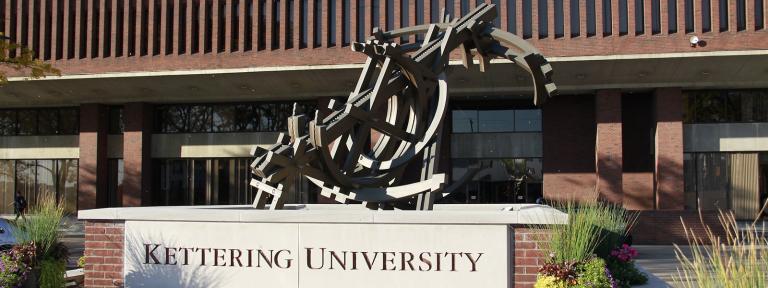
Her idea was to simply present a paper at the Popular Culture Association conference in Albuquerque, New Mexico, and conduct some primary research while there on "Ceremony," a novel by Native American author Leslie Marmon Silko. Students in her Lit 309: Literatures of Multicultural America course recently completed this novel and the truths about Native American history they learned are the kinds of stuff that gives a work of fiction its strength and resiliency.
Corine Coniglio, assistant professor of Liberal Studies at Kettering, believes in the power of fiction and the study of literature in teaching students about the truth regarding American life and history. This is one reason why she required students in her course to read and write about Silko's haunting novel. "Ceremony" is a story of a Native American man of mixed ancestry who returns to his Laguna, New Mexico, reservation following World War II. The book deals with the concepts of self and other, and the connection between the inner, or spiritual, world and physical world in which the characters live. But perhaps one of the most significant aspects that students learned from reading this novel and listening to the results of Coniglio's research is this: the history lessons taught in our modern day schools do not come close to depicting the reality of existence experienced by Native American people.
"After reading Silko's novel, the majority of my students suddenly realized their own ignorance regarding the American history they learned in school," Coniglio explained. "They learned about Native American history from the perspective of a tribal member who served his country during war, and about the inadequate attempts by the U.S. government at paying retributions to Native Americans for various indiscretions toward them during the early years of our country."
To further support this phenomena, Coniglio said that to date, there has only been one official apology from a federal government organization (Bureau of Indian Affairs) for the country's actions toward the Native American community. More importantly, areas such as the Laguna reservation have been mined by the Federal Government for uranium, which is used in nuclear weaponry and for other destructive purposes. Long-term environmental consequences such as water pollution continue to exist there. In 1978,the EPA informed the Laguna pueblo people that all of their available water sources were dangerously contaminated by radioactivity, and that the tribal council building, community center, and newly constructed buildings were all radioactive as well. Students in her class had no idea that such practices and governmental behavior toward Native American populations still existed today.
Scientists "had taken these beautiful rocks from deep within earth and they had laid them in a monstrous design, realizing destruction on a scale only they could have dreamed," writes Silko.
"The student synthesis essays written about 'Ceremony' really reflect their change in perception about Native American culture and identity, as well as their amazement that our government could actually continue treating this important group of people in the same manner," Coniglio said. "Since Silko is a Native American, the students gain a new perspective about the real essence of American history instead of sterilized published accounts of events as portrayed in text books used by schools throughout the country. Students were quite shocked at what the actual historical reality is."
During her preliminary research while in New Mexico, Coniglio also met with several Native Americans who know Leslie Marmon Silko. Based on their interactions with Silko, they feel a tremendous amount of pride in her use of story telling and the oral tradition of Native American people in all her works. For them, Silko continues to use this tradition in all of her work and they are pleased that such a tradition will not disappear anytime soon.
For Coniglio and other faculty in the Liberal Studies Dept., this is just the type of learning they hope to impart to Kettering students, who typically fill their academic schedules with courses in engineering, management and the sciences. As an institution dedicated to producing well-rounded professionals capable of considering the human dimension to business and industry, Coniglio believes that students at the University find it satisfying to learn about social and cultural concepts that could ultimately enhance their college experiences and one day inform their professional lives.
Coniglio will present a paper on Silko's "Ceremony" March 20-23 at the Native American Literature Symposium in Mystic Lake, Minn.
Written by Gary J. Erwin
(810) 762-9538
gerwin@kettering.edu